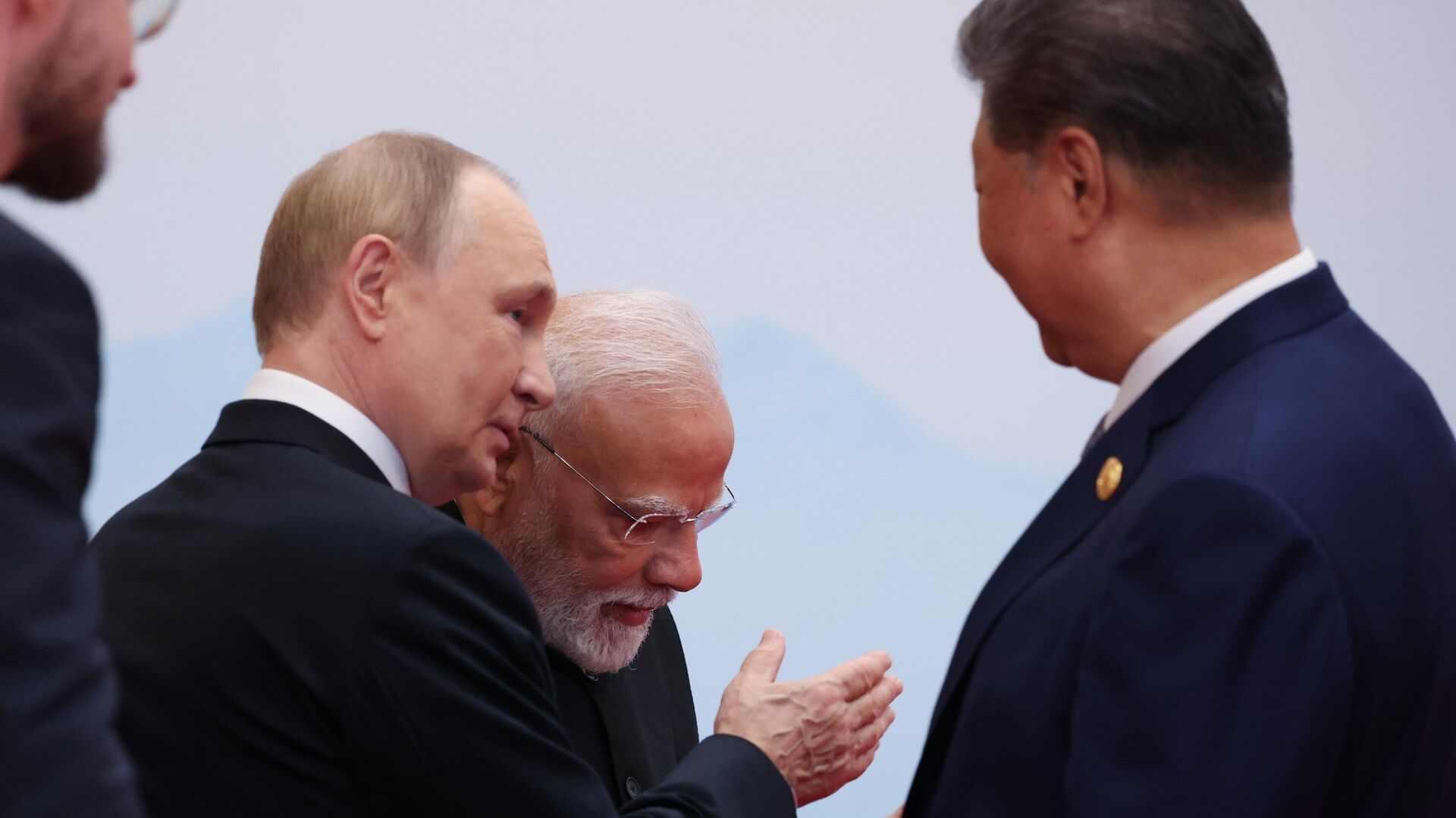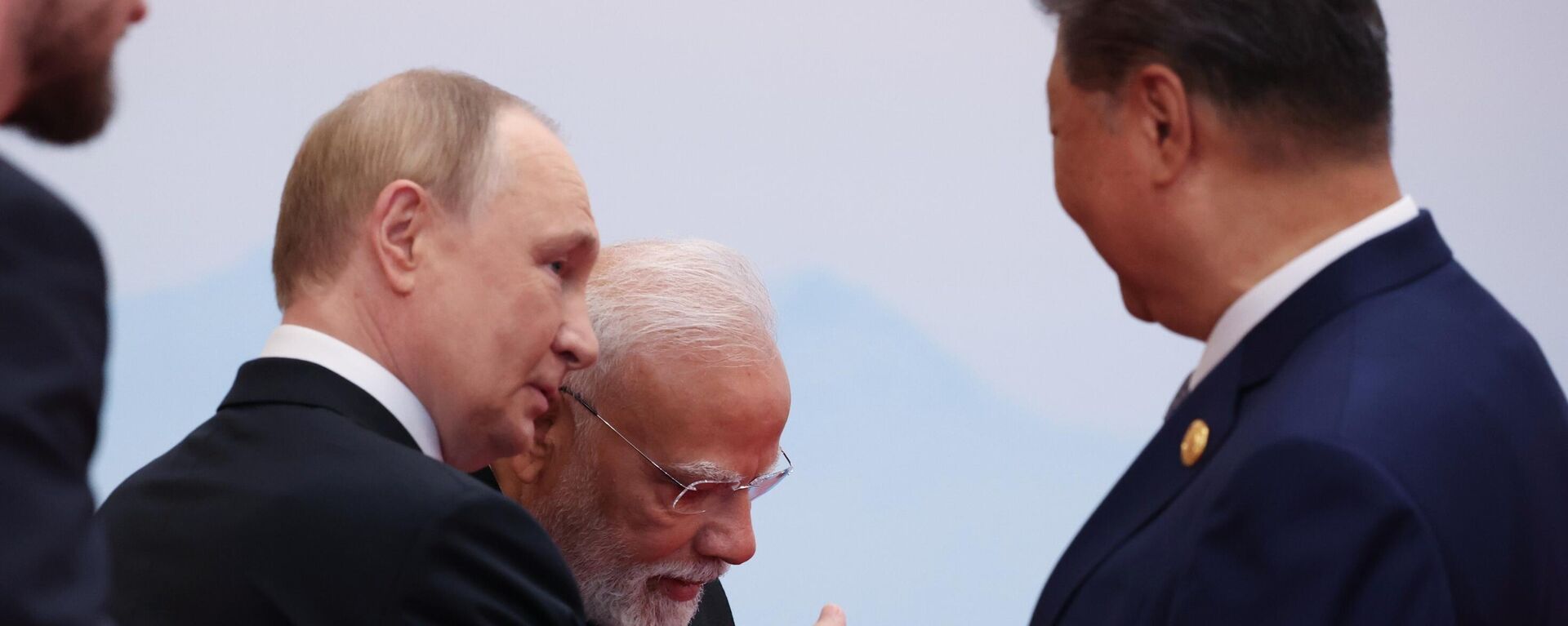India's Tightening Bonds with Russia and China: Wake-Up Call for the West?
11:33 02.09.2025 (Updated: 11:41 02.09.2025)

© Sputnik / POOL
/ Subscribe
With the President Donald Trump-led US administration sending Indo-US ties to the South with their repeated tirades against New Delhi, India is strategically moving towards having closer relations with China and Russia.
The recent Shanghai Cooperation Organisation (SCO) summit in Tianjin, which was headlined by Prime Minister Narendra Modi, emphasising on having robust economic ties with China and solidifying India's strategic partnership with Russia despite severe US pressure to part ways with the Eurasian state, underlines New Delhi's commitment to its strategic autonomy, pundits have said.
India and Russia have historically had a strong relationship and that strength has borne out over the decades. Hence, the tariffs in particular have not pushed India closer to Russia or any of that sort, stated Manoj Kewalramani, the Chairperson of the Indo-Pacific Studies Programme at the Takshashila Institution, a Bengaluru-based foreign policy think tank.
India and Russia have historically had a strong relationship and that strength has borne out over the decades. Hence, the tariffs in particular have not pushed India closer to Russia or any of that sort, stated Manoj Kewalramani, the Chairperson of the Indo-Pacific Studies Programme at the Takshashila Institution, a Bengaluru-based foreign policy think tank.
"India has always kept its relationship with Russia independent of external pressures. It sees strategic value in that relationship, and Russia sees strategic value in the relationship with India. So nobody should be giving credit to Washington for what is a historically close relationship," Kewalramani told Sputnik India.
When it comes to China, if one sees India's engagement with China over the last year, the current sort of approach by both sides to try and build bridges began in October last year, which is well before the election of Donald Trump as US president. So there is an internal logic to this relationship and the two sides are trying to arrive at some sort of a new strategic balance. Therefore, again, the tariffs shouldn't be given too much credit for what is essentially an inherent relationship that's trying to arrive at a new balance, the strategic affairs expert added.
Rather, to a certain extent, the environment within which both these countries find themselves, the global order, the way it is, those create certain incentives, of course, for normalization. But again, the process predates the election of Donald Trump or the tariffs, he noted.
India's willingness to engage with Russia and China is an expression of India's sovereignty. It's an expression of Indian's strategic autonomy and something that New Delhi has been saying for a very long time - that India exercises strategic autonomy. It believes that it's pursuing a policy of multi-alignment, and therefore, this is an expression of that, the think tanker stressed.
Rather, to a certain extent, the environment within which both these countries find themselves, the global order, the way it is, those create certain incentives, of course, for normalization. But again, the process predates the election of Donald Trump or the tariffs, he noted.
India's willingness to engage with Russia and China is an expression of India's sovereignty. It's an expression of Indian's strategic autonomy and something that New Delhi has been saying for a very long time - that India exercises strategic autonomy. It believes that it's pursuing a policy of multi-alignment, and therefore, this is an expression of that, the think tanker stressed.
"India has its relationship with Russia, India has its relationship with China, India has its relationship with the US. Each of those relationships has their own rhythm, own current, own incentives, own interests and own fault lines. That's how I would look at this, rather than necessarily juxtaposing one with the other," Kewalramani argued.
When it comes to any relationship, each relationship has its own levels of dependence that it generates and those need not be necessarily politically articulated. Those can be quite inherent. India's engagement with China, for instance, the nature of its economic relationship is quite lopsided, he reckoned.
China enjoys a trade surplus with India and India has a trade deficit of over $100 billion with China. India is also dependent on certain critical products that come from China, whether it's pharmaceutical APIs, whether it's tunnel-boring machines, the international relations commentator pointed out.
The fact is that India sees value in its partnership with Russia. India sees a value that it can derive in normalizing the relationship with China. And India obviously has enjoyed great value in terms of its relationship with the U.S and with the broader West in terms of India's economic and security interests. So, that's the pathway that India would like to continue, Kewalramani underlined.
What Washington should look at is realize that its policies tend to shape the incentives of other countries also. And if you need to engage with partners and build partnerships for the long term, you can't seek short-term transactional gains and desire just that. You need to invest in partners for the longer term, the strategic affairs analyst emphasised.
China enjoys a trade surplus with India and India has a trade deficit of over $100 billion with China. India is also dependent on certain critical products that come from China, whether it's pharmaceutical APIs, whether it's tunnel-boring machines, the international relations commentator pointed out.
The fact is that India sees value in its partnership with Russia. India sees a value that it can derive in normalizing the relationship with China. And India obviously has enjoyed great value in terms of its relationship with the U.S and with the broader West in terms of India's economic and security interests. So, that's the pathway that India would like to continue, Kewalramani underlined.
What Washington should look at is realize that its policies tend to shape the incentives of other countries also. And if you need to engage with partners and build partnerships for the long term, you can't seek short-term transactional gains and desire just that. You need to invest in partners for the longer term, the strategic affairs analyst emphasised.
"The India-Russia relationship is an example of that. When you invest in a long-term partnership with political proximity, you can yield dividends and rewards over a long period of time. So yes, to that extent, Washington should take note of these partnerships, of these conversations that are happening in Tianjin, because they do indicate that when Washington starts to change the incentives and become disruptive, others will have to find different ways in which they can pursue their interests," Kewalramani insisted.
Meanwhile, Antara Ghosal Singh, the China Fellow at Observer Research Foundation (ORF), said that with Russia, India has always shared a close relationship, while with China, there has been a positive turn in ties since last year. But US' policy choices have further accelerated the trend.
Firstly, India doesn't always put Russia-China together, that's a very Western construct. India has always had good ties with Russia, while China's ties with Russia have fluctuated in history. Having said that, India has been concerned about deepening China-Russia collaboration due to Western pressure, she mentioned.
Firstly, India doesn't always put Russia-China together, that's a very Western construct. India has always had good ties with Russia, while China's ties with Russia have fluctuated in history. Having said that, India has been concerned about deepening China-Russia collaboration due to Western pressure, she mentioned.
"On the other hand, India's deepening ties with the US might have been a concern for the Russian side. But for India, the concept of strategic autonomy is very central; there is little appetite for alliances. And the recent SCO participation only proves that," Singh said in an interview with Sputnik India.
With Russia, India has very close military as well as economic ties. Its ties with Russia are time-tested and serve our interests well, while ties with China remain complicated; there has been a positive turn since last year, not yet clear what kind of progress this will make, the analyst assessed.
Additionally, there's clearly some concern in the West about a shift in world order. Especially in terms of de-dollarisation, given the interest shown by various countries in multilateral bodies like the SCO and BRICS. Plus, multipolarity is increasingly becoming a reality, but India's position is that we aspire for not just a multipolar world but also a multipolar Asia, she concluded.
Additionally, there's clearly some concern in the West about a shift in world order. Especially in terms of de-dollarisation, given the interest shown by various countries in multilateral bodies like the SCO and BRICS. Plus, multipolarity is increasingly becoming a reality, but India's position is that we aspire for not just a multipolar world but also a multipolar Asia, she concluded.


